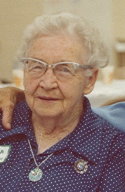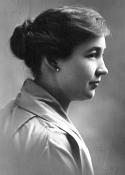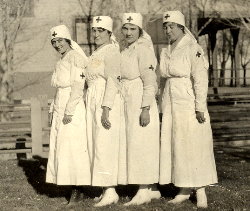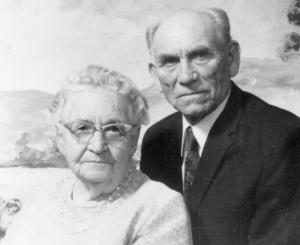
 I was born in Tooele, Utah, on Sunday, August 8, 1897, to Alvin James McCuistion and Mary Eliza Kirk McCuistion. Our family at that time consisted of six boys, my father having been married previously to Mary Eliza De LaMare. She died leaving him with three boys and a girl. The baby girl was raised by his sister, Isabel Parker.
I was born in Tooele, Utah, on Sunday, August 8, 1897, to Alvin James McCuistion and Mary Eliza Kirk McCuistion. Our family at that time consisted of six boys, my father having been married previously to Mary Eliza De LaMare. She died leaving him with three boys and a girl. The baby girl was raised by his sister, Isabel Parker.
When he married my mother, he had three boys. Then my mother had three boys, Fay, Horace, and Delmar; then I was born. After me were my brothers, Marion Edsul and Kenneth. Then a sister, Sadie, a sister, Maida, a brother Joe, a sister Edith, and two more boys, Bert and Shirley, which made all together fifteen children. We lived in Tooele until after my tenth birthday. While in Tooele, I took five or six music lessons and was trying to learn to play the piano. My brother Horace took a few music lessons from the same teacher.
In February 1908, my father moved the family to Montello, Nevada, to a ranch known as Pilot Peach Ranch at the foot of the west side of Pilot Peak in Nevada. That fall father persuaded the State of Nevada to establish a school for us on the ranch. He furnished the building, and the state supplied the seats, blackboards, teacher, and everything that a school needs. We had seven children in school and another boy boarded with us and went to school that year. We had that school on the ranch for three years.
After living on this ranch for about four years, my father decided he wanted his own ranch. The ranch we had been living on was owned by the Sparks Harold Company, a big cattle outfit that owned ranches and ran cattle out in the western country.
In as much as he had used his homestead right on a piece of ground in Utah, my brother Oliver, the oldest boy in the family, homesteaded one hundred and sixty acres. My father and his older children built a one-room tie house. The family grubbed sage brush by hand and planted trees, flowers, lawns, alfalfa, grain, and potatoes. This all had to be done before winter set in. They even constructed a small reservoir to hold some of the water from the spring run off.

Red Cross-Mrs Donaldson-Mrs Bert Cave-Freda Johnson-Bertha McCustion Kimber
In the fall of 1911, my father and Uncle Bill Gollaher, a half brother of Dad’s who lived with us, and with the help of the boys, began construction of a large two-story house. It was finished in the spring of 1912 and we moved down to that place. The homestead cabin that was constructed on the place became the school house. In as much as there were no more families in the area with children of school age, the teacher had to live with the McCuistion family. My father, mother and uncle constituted the school board. They would hire, fire, and pay the teachers. School was maintained for our family on the ranch from then until 1930, continuously. It ended when my two younger brothers graduated from the eighth grade. There was a succession of teachers. My brothers married two of them.
Most people traveling near the ranch would always stop there for they knew that they were always welcome and could most generally get a bite to eat. It was a good stopping place for all the sheep men and wayfarers, traveling from Deep Creek, Utah to Tacoma and Montello, Nevada. Many times the supper table was set for twenty or thirty people at one time. I, being the oldest of the girls, did most of the cooking for these large crowds.
When I was about thirteen years of age, a brother-in-law persuaded me to play for dances. I’d practiced a little bit and fiddled away with the music as much as I knew during the years from the time we left Tooele until I was about thirteen. I couldn’t do much playing but I did know how to chord, as they called it. I used to come in and play for the dances with the Robinson brothers, Bert and George Robinson. That got me started practicing more and learning more music.
My oldest half-sister left the aunt who had raised her and came out and lived with the family beginning in 1910 until 1913 when she married George Robinson. He was very patient with me, and he taught me just about all I know about music. My brother Horace played the trumpet and my brother Fay played the violin. We had our orchestra for a number of years. We played for the first dance in Wendover, then we played when the Western Pacific Hotel was opened. I played for the first wedding dance that was ever held in Wendover. I played all around the country for a number of years. I played in the orchestra at Grouse Creek for quite a few years after I was married. I know there were several times that I’d go up on the mail in the afternoon and stay all night with Grandma Kimber and then come back on the mail after the dance the next morning. There were some times I used to get awfully cold playing for the dances. We’d be up on the stage and the stoves were all down in the hall. The dancers didn’t want to keep the fires going, so I’d go home nearly frozen from some of those dances in the winter time.
In 1916 I went to visit Olive Tanner up on Grouse Creek. I met her when she and her mother, Aunt Mandy, used to come down and visit with Dell and Alice Hart, who were living here in Montello. I spent a month or two up there at her place. Then she came back down to the ranch with me and spent about a month. During that time we had the first onslaught of rabies on the ranch. A coyote came to the ranch one night and bit any number of young pigs that were being fattened for market. It bit two or three milk cows and calves, chickens, and any number of sheep. The loss to my folks that winter was just almost more than they could stand. The rabies were very bad.

Bertha & Bill Kimber
I first met Bill in 1916 at a 24th of July celebration. It wasn’t until 1921 that we got married. We went to the Salt Lake Temple to be married. We were married by President George F. Richards. It made me quite happy because Brother Richards was a neighbor of ours in Tooele. A big reception was given for us by my people in Salt Lake. Then when we came back to Montello, there was a big reception held at the ranch.
We went to the Kimber ranch to live. We lived with Bill’s folks part of the winter until they could move to a home they had up on the creek. From then on the ranch was our headquarters.
There were five children born to us, our oldest girl, Barbara, our sons, Kay, Jack, Bryce and Merrill.
During the years on the ranch, we worked hard for a good many years. We ran a sheep shearing outfit there. It seemed like we always had hired men to help with the haying and potatoes digging and whatever work there was to do. It meant a lot of work and a lot of cooking for me.
One year the children all got the whooping cough and pneumonia and we nursed them through that siege. Another year they got scarlet fever and the mumps. That resulted in a siege of rheumatic fever for Kay. He was down all summer long with rheumatic fever. They all came through all right, none of them ever got hurt, none of them ever had a prolonged illness.
Kay went into the service in 1943 and Jack in 1944. Bryce and Merrill went into the service when the Korean War started. Barbara was with the Cadet nurses, taking a course in nursing at the LDS Hospital in Salt Lake. They all got home from the war without any misfortune befalling them.
After a major operation that Bill had, the doctors advised him to give up the heavy ranch work, so we leased the ranch to Jack for a year or two and moved to Montello where we made over a little old house that we’d purchased. We made it into a comfortable home for us. Eventually we sold the ranch to Jack.
Bertha passed away in 1989 and is buried in the Grouse Creek Cemetery.
